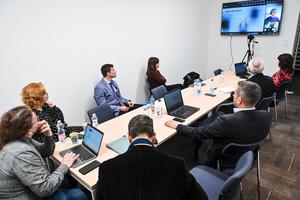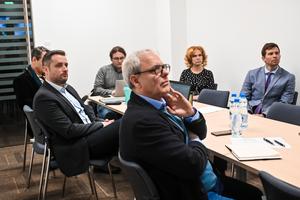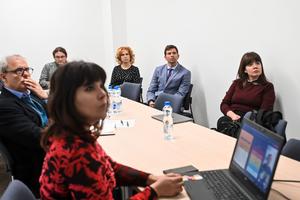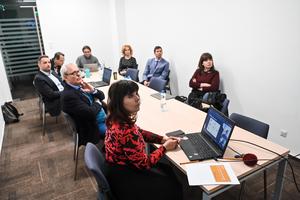The Institute of the Information Society and the Center for Artificial Intelligence and Cybersecurity at University of Rijeka organized a joint workshop on 25 January 2023 entitled Current challenges of artificial intelligence - a dialogue between technologists and lawyers.
The English-language workshop, divided into two content units (technology and law panel), featured a total of ten presentations, which provided the basis for the wide-ranging discussion that unfolded. In the presentations, higher-level theoretical approaches were complemented by practical research, presentations of developments and technological demonstrations. The program has not only strengthened the dialogue between Croatian and Hungarian researchers, but also the intensive exchange of knowledge between technological specialists and lawyers.
In the first presentation of the technology panel, Arian Skoki talked about possible machine learning predictions of injuries in football players, followed by Anna Maria Mihel who presented machine learning methods for estimating tidal river flooding. The next speaker, András Horváth, examined the potential failures of AI systems and gave several examples of how algorithms can be misled. The final speaker of the session was Pál Vadász, who gave an overview of NLP technologies and the future of AI in the field of legal informatics.
In the first part of the law panel, Franko Hrzic gave a presentation on the challenges of using medical datasets, followed by a joint presentation by Ana Pošćić and Adrijana Martinović on issues related to the teaching of legal aspects of artificial intelligence, and then Kinga Sorbán presented the opportunities and risks of AI-based hate speech moderation. In the second half of the session, Márton Domokos investigated how artificial intelligence can be integrated into HR processes and whether it will ever be acceptable for a machine to decide in employment matters, followed by András Hárs who presented the results of the University of Public Service's international online survey on legal professionals' attitudes towards AI-based technologies. In the last presentation of the workshop, András Pünkösty sought to answer the question of how to increase trust in artificial intelligence solutions.
The workshop was one stage of a longer cooperation and the participants agreed on the need to continue the professional dialogue in the future.
Workshop program and abstracts of the speakers.
Photo: Szilágyi Dénes



